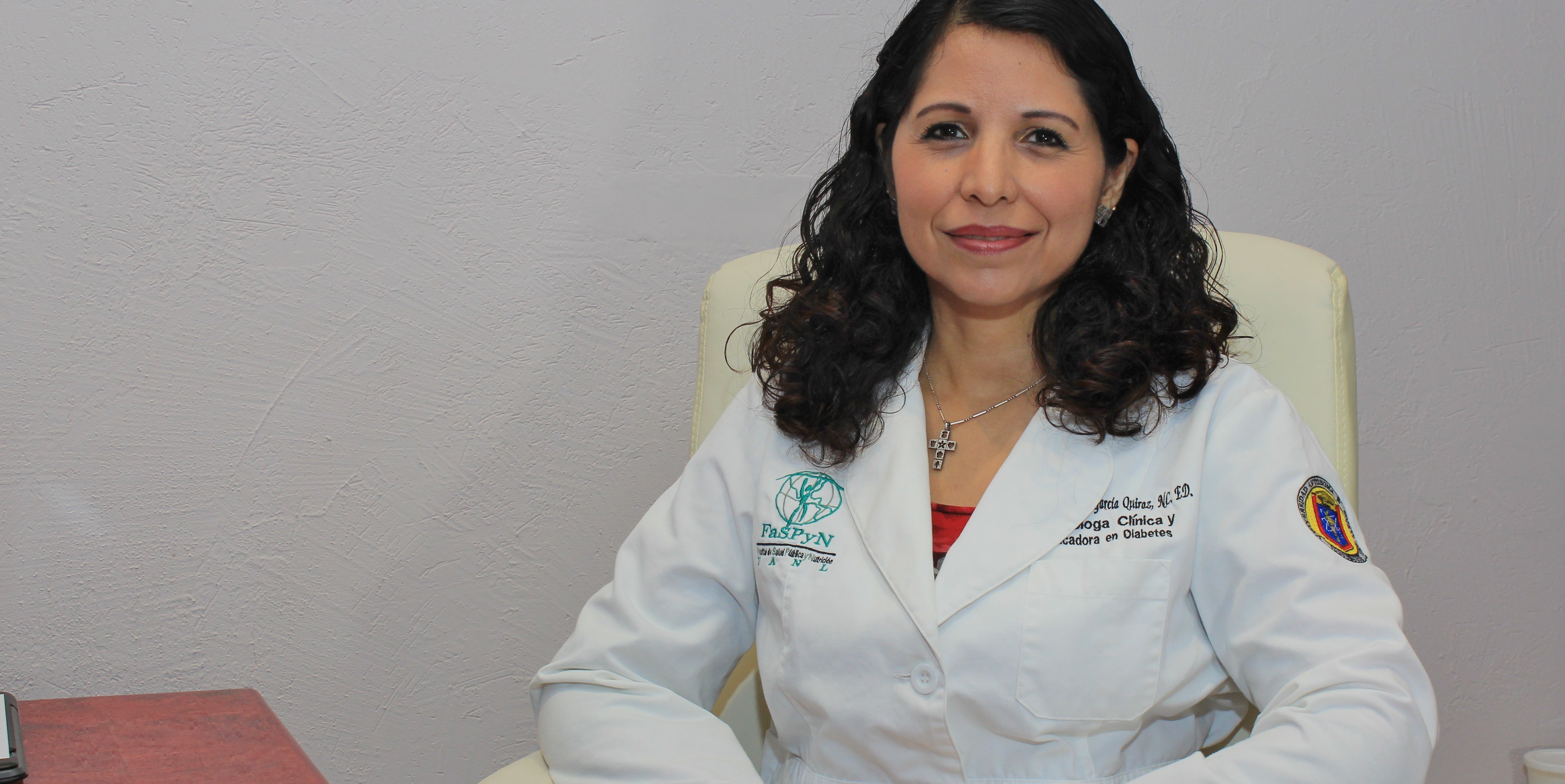“So concerning yogurt, there is a big misunderstanding with some of the available information. Thus it is difficult for nutritionists to get a full picture about the benefits of yogurt. Therefore they read on the internet, where they find a lot of unverified information, which has no scientific base. That is because they have a limited knowledge on how to get reliable information. Moreover it’s a difficulty that I see with my students. Their inability to find reliable information thus works in favor of poor information circulation. For instance, we see online personalities take advantage of their audience to spread a bad buzz about milk, without any scientific evidence. In this perspective, the Yogurt in Nutrition Initiative has a clear contribution, because it helps explain, with science-backed facts, what the benefits of yogurt are, including in diet for diabetes.”
I see the evidence of the benefits of yogurt everyday with my patients’ blood control
“But the main difficulty is that my patients have myths about dairy products and yogurt consumption. In the case of lactose intolerance, they believe that it impacts their ability to enjoy yogurt. So here again, we are facing a question of misinformation. With diabetes, it is even more obvious, especially when it comes to diet for diabetes. Most of my patients suffer from diabetes. People who live with diabetes usually do not know anything about the benefits of yogurt. Just like everyone, they look on the internet for dietary recommendations and see yogurt contains too much sugar for instance. So they are concerned it may not fit in their diet for diabetes.
So when they come to me, I start to give them explanations, and we start their diabetes education. I then explain that recent research indicates that eating yogurt is associated with a lower risk of developing type 2 diabetes, linked to better glucose metabolism and weight management. Some studies even demonstrated 17% lower diabetes risk with 3 or more servings of yogurt a day.
In conclusion, as a trained and experienced nutritionist, I see the evidence of the benefits of yogurt everyday with their blood sugar control. Indeed the test is a powerful validation. Patients see that their blood sugar level remains perfectly stable through time while they regularly have yogurt. I consider that the two best options are plain yogurt, which preferably contains probiotics (live and active cultures) and plain greek yogurt. These are the best options for people who live with diabetes. I recomend to include at least one portion of each daily in my patients’ diet for diabetes.
In the end, that is how they see that yogurt can be a valuable component in diabetes management.”
I take their preferences into account and I try to negotiate a meal plan, which they can follow as a diet for diabetes
“So with patients, I always start from their preferences. Indeed I take their preferences into account and I try to negotiate a meal plan, which they can follow as a diet for diabetes. Fortunately yogurt is a very versatile food, so it is easy to recommend its consumption in different ways. As a result we always find a way to integrate it in their diet. For example, some of my patients prefer to have it at breakfast, some as snacks, or even during meals, add it in their sauce. Also, some enjoy sweet things, others prefer salty tastes. There are lots of possibilities for healthy food swaps with yogurt, which we explore together.
Therefore, what you realize as a nutritionist is that change in patients’ dietary pattern cannot happen drastically. In addition, there is a particular behaviour for people who suffer from a chronicle disease. As a result changing things step by step works better. So you need to get to know each patient, take their habits into account, and be practical to build a personalized solution.”

References recommended by Alejandra
- Díaz‐López, et al. (2016). Dairy product consumption and risk of type 2 diabetes in an elderly Spanish Mediterranean population at high cardiovascular risk. Eur J Nutr. 55:1, 349-360
- Chen et al. (2014). Dairy consumption and risk of type 2 diabetes: 3 cohorts of US adults and an updated. BMC Medicine, 12:215. http://bmcmedicine.biomedcentral.com/articles/10.1186/s12916-014-0215-1
- Tong, X.; Dong, J.Y.; Wu, Z.W.; Li, W.; Qin, L.Q. (2014). Dairy consumption and risk of type 2 diabetes mellitus: A meta-analysis of cohort studies. Eur. J. Clin. Nutr. http://www.nature.com/ejcn/journal/v65/n9/pdf/ejcn201162a.pdf
- O’Connor, L. M.; Lentjes, M. A. H.; Luben, R. N.; Khaw, K.; Wareham, N.J.; Forouhi, N. G. (2014). Dietary dairy product intake and incident type 2 diabetes: a prospective study using dietary data from a 7-day food diary. Diabetologia, 57:909–917. https://www.ncbi.nlm.nih.gov/pmc/articles/PMC3980034/pdf/125_2014_Article_3176.pdf
- Salas-Salvadó J, et al. (2014). Prevention of Diabetes With Mediterranean Diets: A Subgroup Analysis of a Randomized Trial. Ann Intern Med 7;160(1):1-10
- Ramon Estruch, Emilio Ros, Jordi Salas-Salvadó, Maria Isabel Covas, Dolores Corella, Fernando Arós, Enrique Gómez-Gracia et al.(2013) Primary Prevention of Cardiovascular Disease with a Mediterranean Diet. Engl J Med 368:1279-1290. http://www.nejm.org/doi/pdf/10.1056/NEJMoa1200303
- Mozaffarian, D.; Hao, T.; Rimm, E.B.; Willett, W.C.; Hu, F.B. (2011). Changes in diet and lifestyle and long-term weight gain in women and men. N. Engl. J. Med., 364, 2392–2404. http://www.nejm.org/doi/pdf/10.1056/NEJMoa1014296
- Nancy Babio Sánchez, Guillermo Mena Sánchez and Jordi Salas-Salvadó. Report New Scientific Evidence of Benefits or Yoghurt Consumption. IISPV Institute D’ Investigació Sanitaria Pere Virgili. Reus, Tarragona (Spain). http://nutriciohumana.com/pdf/informe_beneficios_yogur_ENG.pdf
- Panahi et al. (2016). The Potential Role of Yogurt in Weight Management and Prevention of Type 2 Diabetes. J Am Coll Nutr. Jun 22:1-15 May; 67(3):232-8. http://www.tandfonline.com/doi/full/10.1080/07315724.2015.1102103
Alejandra’s biography and links
Alejandra Garcia-Quiroz is a Clinical Dietitian-Nutritionist, Diabetologist, Diabetes Educator and Health/Nutritional Coach.
Education
She has a 24-year on-going clinical practice in the field of Diabetes, Insulin Resistance, PCOS, Dyslipidemia and Clinical Nutrition. She also holds a high degree Specialist in Clinical Nutrition and Geriatrics from the Institute of Post-grad and Sciences in Guadalajara (Jalisco,México), an International Master in Nutrition and Dietetics by the University of León (Spain), as well as a high degree in Diabetes Education and Diabetology from Faculty of Medicine, Univesity La Salle (México) and International Master in Multidisciplinary Health Coaching with a focus on Nutritional Coaching by EISANE and the Institute of Post-grad and Sciences (Spain-Mexico).
Furthermore she has a B.Sc in Nutrition from the Faculty of Public Health and Nutrition (FaSPyN)- University of Nuevo Leon in Monterrey (México).
She finally is a Dietitian-Nutritionist certified by Mexican College of Dietitians/Nutritionists, Level II Anthropometrist certified by the International Society for the Advancement of Kinanthropometry (ISAK), Mental Health Facilitator (MHF) certified by NBCC International and World Health Organization and she is accredited in Clinical Diabetes Management in Primary Care, Diabetes Basics Program, International Diabetes Center (USA).
Current activities
Alejandra is currently a Coordinator of Speciality in Clinical Nutrition and Geriatrics at the Institute of Post-grad and Sciences, Campus Nuevo León (México), Professor at FaSPyN- UANL, Professor at University of Durango, Campus Los Mochis (México), Professor at EISANE Health and Business School (Spain), Nutritionist Resident at Medical Center Hidalgo in Monterrey (Nuevo León, México) and the Founder and CEO of Nutrition for Optimal Health ® (since 2004).
She also serves as Secretary of the Mexican College of Dietitians/Nutritionist, Chapter Nuevo León, Treasurer of Mexican Academy for the Study of Obesity, Chapter Nuevo León, and she is an active member of Latinoamerican Association of Diabetes, the Mexican Association of Nutrition- AMENAC and member of the International Confederation of Dietetics Associations (ICDA).
Speaker and author
In addition, she has more than 300 appearances as a speaker, lecturer and professor at various scientific events, conferences, symposiums, courses and workshops in 30 cities in Mexico, San Salvador (El Salvador) and Alicante (Spain) and she also is the co- author of the chapter 38: “Medical Nutrition Therapy in patients with type 2 diabetes” from the book “The management of diabetes and its comorbidities” (Ochoa et al, 2016) published by Alfill Publishing House in Mexico City.
Connect with Alejandra
Website: http://www.nutrioptimalhealth.com/web
Twitter: @NutriAle_Coach
Linkedin: https://www.linkedin.com/in/NutriAleGarciaQuiroz
Facebook: https://www.facebook.com/NUTRIOLOGA.ED.Alejandra.GarciaQuiroz



